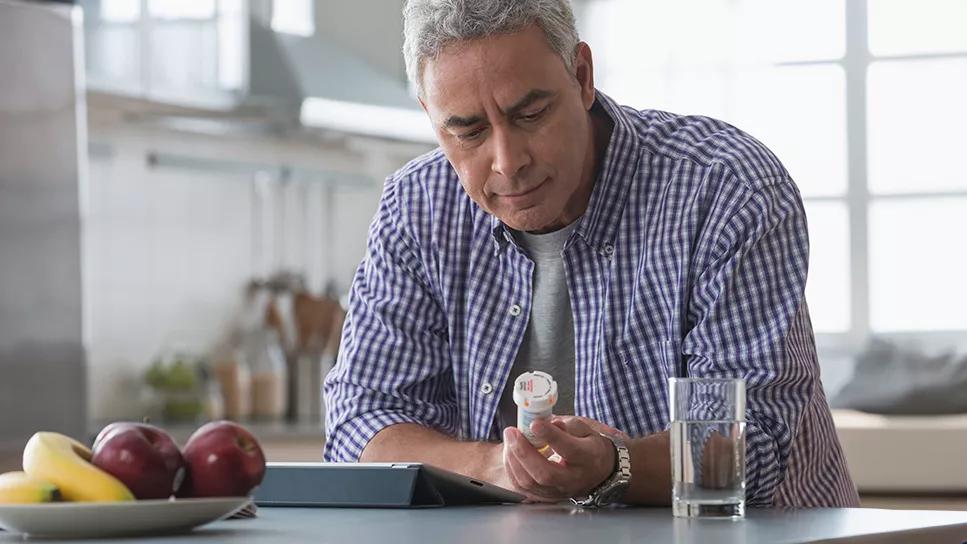Unlike earlier pills, new drugs do not cause liver toxicity

Image content: This image is available to view online.
View image online (https://assets.clevelandclinic.org/transform/10299e93-fc7b-491d-9835-b843e2889e04/24-URL-4530709-Getty-565975257-967x544-1_jpg)
Man examining prescription bottle in kitchen
For patients with testosterone deficiency, intramuscular injection and topical gel have been first-line therapies for decades. Now, a new generation of medications has made oral testosterone a safe option as well.
Advertisement
Cleveland Clinic is a non-profit academic medical center. Advertising on our site helps support our mission. We do not endorse non-Cleveland Clinic products or services. Policy
While cost and lack of insurance coverage present a barrier for some patients, the new oral drugs could be good alternatives for people who have contraindications to other treatments. There are early indications that the oral drugs cause fewer side effects than injections and other long-lasting forms of testosterone replacement therapy, says urologist Petar Bajic, MD, Director of the Center for Men’s Health at Cleveland Clinic.
“Testosterone deficiency is one of the only conditions for which first-line treatment is not a pill,” he says. “But most patients prefer oral medication, and these newer drugs provide that option.”
An older type of oral testosterone was prescribed to patients in the 1980s but fell out of favor because of liver toxicity, he notes. The three new drugs, Jatenzo®, Tlando® and Kyzatrex™, avoid that problem because they bypass the liver to be metabolized through the lymphatic system.
“These new drugs are not dangerous to the liver,” stresses Dr. Bajic.
All three drugs must be taken with food to be effective, he notes. Jatenzo and Tlando should be taken with a meal to ensure proper absorption.
The current first-line therapies for testosterone replacement have some significant downsides. Intramuscular injection can be painful, and topical treatments carry the risk of transference to the patient’s partner or children. Pellet implantation, another treatment option, also can cause pain.
In addition, these therapies seem to have a higher risk of side effects including erythrocytosis, possibly because they are delivered at higher doses and designed to be long-lasting.
Advertisement
“Patients who have tried other forms of testosterone and had a rise in their blood count, particularly with high-duration therapies like injections or testosterone pellets, might see less of that side effect with a shorter-acting oral testosterone,” says Dr. Bajic.
On the other hand, oral testosterone may not be right for all patients, adds urologist Neel Parekh, MD, a male infertility and men’s health specialist at Cleveland Clinic. For example, patients who don’t eat breakfast may not have adequate absorption with certain formulations, and patients who do not already take twice-daily medication may forget to take a dose.
According to Drs. Bajic and Parekh, testosterone replacement therapy should be used for patients who are experiencing symptoms of testosterone deficiency, not to boost testosterone in patients with normal levels.
While most insurance plans don’t cover oral testosterone as a first-line treatment, patients do have some options to make the oral medication more affordable.
For example, insurance coverage may be approved if the patient is not able to use other forms of testosterone replacement therapy or has tried other therapies and experienced side effects.
“If a patient is, let’s say, afraid of needles and not able to have injection therapy, and maybe they have small children and are worried about transferring the topical treatment to their kids, then sometimes that justifies insurance coverage,” says Dr. Bajic.
For patients without insurance coverage, all three medications are available as cash-pay options at specialty pharmacies. Some manufacturers offer rebates to help reduce out-of-pocket costs.
Advertisement
Physicians prescribing testosterone replacement therapy should counsel patients about different options and help them choose the best treatment for them.
“Educating patients about the benefits, risks and proper administration of testosterone replacement therapy is essential for promoting treatment adherence and ensuring patient safety,” says Dr. Parekh. “While the newer generation of oral testosterone does not cause liver toxicity, monitoring patients’ lab work and symptoms in accordance with American Urological Association guidelines is necessary to ensure safe and effective treatment.”
Advertisement
Advertisement
Surprise findings argue for caution about testosterone use in men at risk for fracture
But findings apply only to middle-aged or older men with confirmed hypogonadism
Testosterone deficiency can prove challenging to diagnose and treat
Male factors play a role in about half of all infertility cases, yet men often are not evaluated
Pediatric urologists lead quality improvement initiative, author systemwide guideline
Fixed-dose single-pill combinations and future therapies
Reproductive urologists publish a contemporary review to guide practice
Two recent cases show favorable pain and cosmesis outcomes